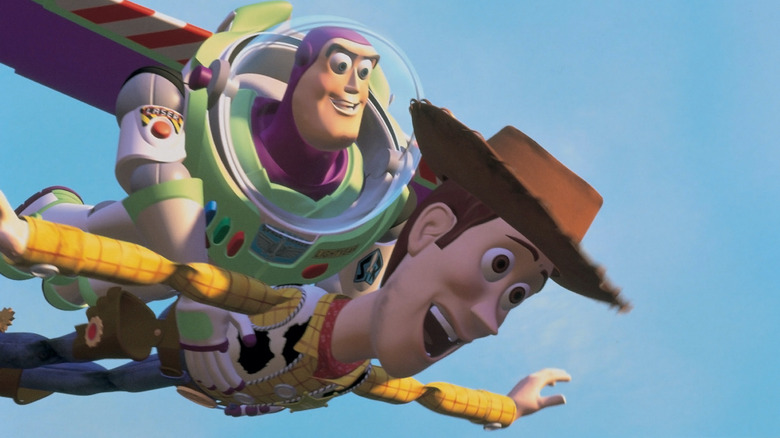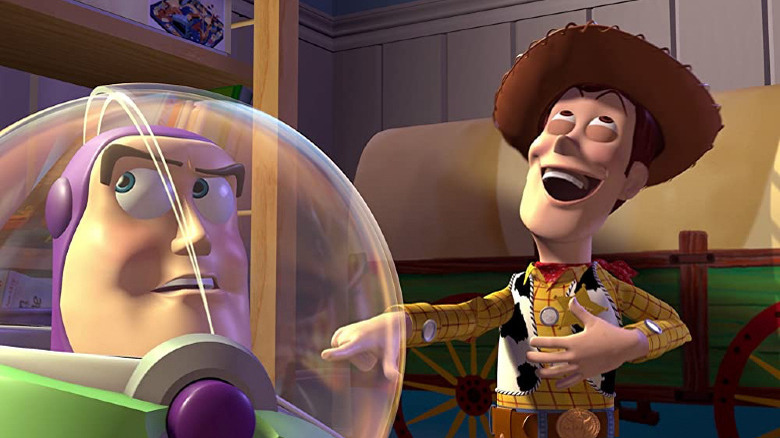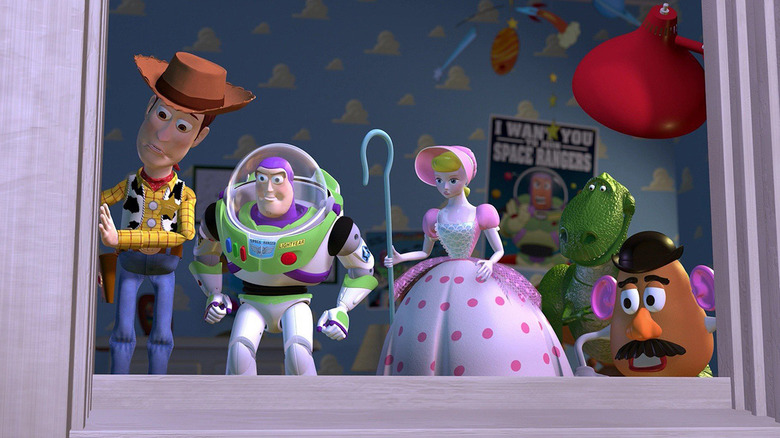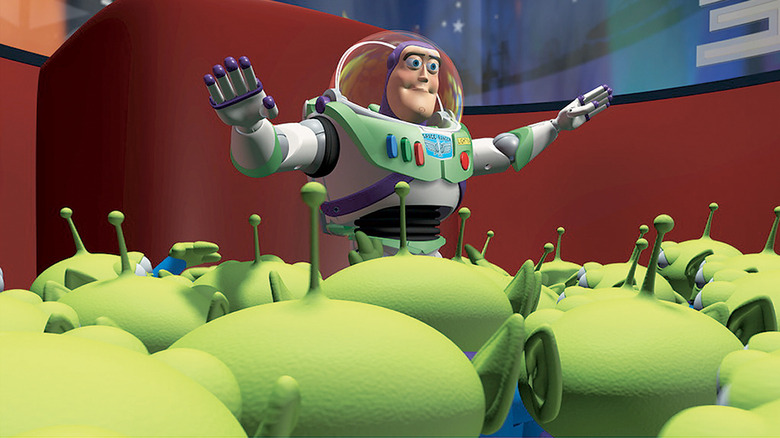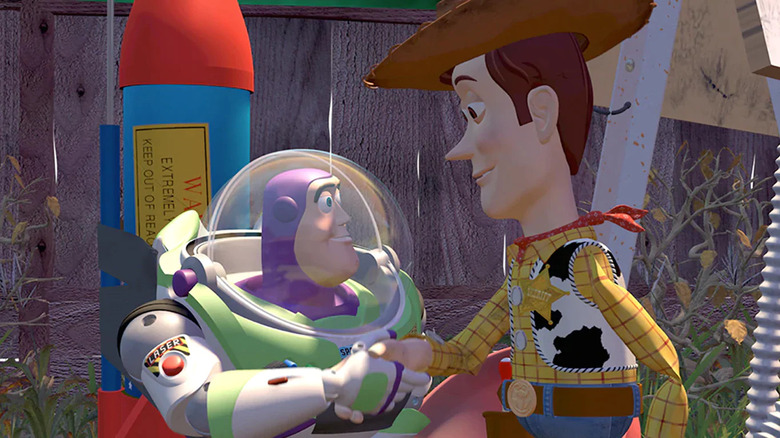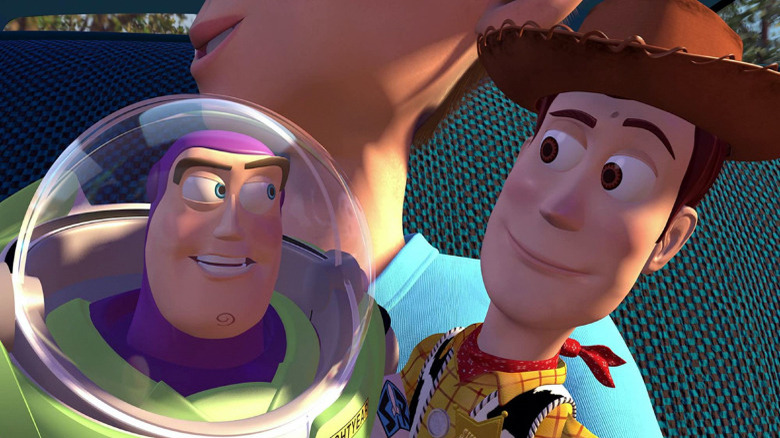Toy Story Ending Explained: Falling With Style
When "Toy Story" was released in 1995, it was a modern wonder of the cinematic world: The first fully computer-animated feature film. That animation shows its age a little bit now, but it really looked like the future back then. And so it was; as the father of two young kids, I find myself up to my eyeballs in CG movies and shows on Netflix. It is so ubiquitous now that sometimes it's hard to find a decent family film to watch together that has good old-fashioned real people in it.
Needless to say, the quality of computer-generated animation has come a long way since 1995, but "Toy Story" still holds up as a classic movie. No doubt moviegoers at the time would have shown up to watch it out of curiosity anyway, but the people at Pixar thankfully decided to use their cutting-edge technology to support a great story packed with memorable characters and themes that strike a chord with moviegoers of all ages. It also helps that they secured great voice talent, with Tom Hanks and Tim Allen, in particular, giving brilliant performances as, respectively, Woody and Buzz Lightyear. Both the voice acting and the storytelling are so good that whenever I see the film, I totally buy into its world and forget that these characters are supposed to be toys.
At 80 minutes long, "Toy Story" is as narratively tight as they come, yet still finds time to layer in themes of friendship, abandonment, community, and identity, all of which pay off beautifully in the film's thrilling conclusion. Let's take a look at how it all plays out.
So what happens in Toy Story again?
"Toy Story" opens with just another day at the office for the toys in Andy's bedroom, until Sheriff Woody (Tom Hanks) calls an important meeting. The first topic on the agenda is the family's upcoming move, followed by the alarming news that Andy's birthday party has been moved forward to today. This causes panic among the toys as they worry that they might be replaced by something new and send a toy soldier recon unit to report on the gift opening. Woody assures them they have nothing to worry about, but soon he is the one sweating it because Andy receives a shiny new Buzz Lightyear action figure (Tim Allen).
Buzz believes he is a real Space Ranger and the other toys are all super-impressed by his range of gadgets and flying skills (or "falling with style," as Woody derisively puts it). Even worse for the sheriff, Buzz quickly becomes Andy's new favorite, leaving him feeling extremely jealous. Things come to a head when Andy's mom takes him out for dinner at Pizza Planet, allowing him to bring only one toy along. To ensure that he's the first pick, Woody concocts a devious plan to knock Buzz down behind some furniture so Andy won't find him but accidentally sends Buzz tumbling out the window instead. This puts Woody on even worse terms with the rest of the toys, who brand him a murderer.
One trip-gone-wrong to Pizza Planet later, Woody and Buzz find themselves in the clutches of Sid, the nasty kid next door who loves destroying toys. With Woody trapped under a toolbox and Buzz strapped to a highly explosive firework rocket, can the mismatched duo settle their differences and escape to make it back in time for moving day?
The fear of abandonment
Andy's toys form a tight-knit community with Woody as their leader, and they adhere closely to the one toy rule: They can only come alive when humans aren't present and must do the best they can to return to the spot they were left when someone is approaching. Woody initially seems like a fair and level-headed decision-maker, well-liked and respected by the other toys. While they all live for Andy, the good spirits within the community hide a deeper anxiety: One day, they will be replaced by a better toy and cast aside. This fear of abandonment develops a number of ways in the "Toy Story" sequels, from the purgatory of storage in the attic to the total rejection of being given away to charity. Perhaps more than the others, Woody realizes that one day Andy will grow up and no longer need any of them, so it is his duty to provide as much joy for as long as the boy loves him.
This fear of abandonment is the most powerful theme running through the "Toy Story" films — one that hits home because we all have those anxieties at some point or another. Children sometimes worry that their parents might leave them or stop loving them, while parents are routinely struck by the bittersweet knowledge that their babies will grow up, stop wanting cuddles, and eventually leave them behind to start their own adult lives. Even in social scenarios, we sometimes feel envious and left out when a friend starts hanging out with someone new.
This abandonment anxiety fuels Woody's jealousy of Buzz and, in turn, drives the rest of the narrative in "Toy Story" towards its exciting conclusion.
I will go sailing no more
Prior to Buzz's arrival, all of Andy's toys know that they are toys and their reason for existing is to make children happy. This affords them a strong communal bond. Buzz, on the other hand, is fresh out of the box and believes he is a real Space Ranger who has landed on an alien planet. A lot of the comedy in the early exchanges between Buzz, Woody, and the other toys in "Toy Story" comes from Buzz's blustering certainty that he's a real action hero, even down to his ability to fly. Much to Woody's annoyance, this belief is reinforced when a series of flukey incidents enable Buzz to "fly" around Andy's room and impress the other toys even further.
Due to Buzz's steadfast belief in himself, it comes as a major shock to him when, while trapped in Sid's house, he sees a TV commercial for a Buzz Lightyear toy just like him. Even more disheartening is a shot of an aisle in a toy store lined with hundreds of Buzz Lightyears, driving home the reality that he is not unique. To add further insult to injury, a disclaimer flashes up on the screen: "Not a flying toy."
Buzz is heartbroken, but his pride still won't let him believe it. He sees an open window, summons up his resolve, utters his famous catchphrase, and launches himself toward freedom, only to plummet down the stairs and break his arm off. After that, he loses all hope, which further hinders his and Woody's chances of escaping destruction at the cruel hands of Sid.
You've got a friend in me
Friendship is another major theme of the "Toy Story" films. As Andy's favorite toy, Woody is like the boy's best friend, as we see in the opening sequence which makes it clear that he is the absolute top dog in Andy's eyes. Woody reciprocates this affection by saying "You're my favorite deputy" when Andy pulls his drawstring. The Randy Newman theme song "You've Got a Friend in Me" plays over the opening credits, just in case we missed the point.
There is also a great deal of friendship between all of Andy's toys, even if they bicker at times. They are a loyal bunch, even to newcomers, as we see when they turn on Woody, believing that he knocked Buzz out of the window on purpose. Later, we see there is solidarity between all toys when the motley collection of abused mutants that Sid has experimented on belie their unsettling appearances to help Woody and Buzz make their escape.
Finally, and most importantly, there is the friendship that develops between Woody and Buzz. It's a classic buddy movie dynamic, placing two very different people in a scenario where they must learn to trust each other and build grudging respect before finally becoming close friends. It's a scenario that has been done hundreds of times in live-action movies and "Toy Story" does it just as well as any of them.
Woody and Buzz's budding friendship is crucial to their escape from Sid. Buzz is almost catatonic after finding out he's just a lump of mass-produced plastic, and it is only after Woody swallows his pride and admits what a cool toy Buzz is that the Space Ranger snaps out of it and springs into action.
Reunited with Andy
"Toy Story" ends with a thrilling set piece that draws all these themes together. Woody and Buzz, still with a very big firework taped to his back, chase down the moving van transporting the family's belongings. They know that if they get left behind, there will be no hope of ever seeing Andy or their friends again. As a last resort, Woody lights the rocket's fuse to help them catch up with the van. Unfortunately, the firework sends them blasting straight up in the air. Just before it explodes, however, Buzz extends his wings, cutting the tape. Holding onto Woody, he glides through the sky and drops them into the family car right next to Andy.
This is where Buzz and Woody's friendship is truly sealed. Woody marvels that Buzz can really fly, only for the Space Ranger to call back to the sheriff's earlier line: "This isn't flying, it's falling with style!" Woody responds by yelling Buzz's catchphrase ("To infinity and beyond!") as they soar through the air. Do the physics of this scene make sense? Probably not, but hey, it's a film about living toys and a triumphant way to complete Buzz's arc.
The film ends at Christmas with another recon mission to find out what gifts Santa has brought Andy. This time, the toys are really excited about what new toys will join them. Woody has similarly accepted his place as the second favorite to Buzz, and it is only the Space Ranger who listens to see if he will be usurped. It turns out they all have a new threat to worry about because Andy's got a new puppy! Good luck, guys; the last thing you want to be is a toy left lying around with a dog looking for something to chew.
